Prepare for breastfeeding
Preparing to breastfeed before the birth
It's good to find out as much as you can about breastfeeding before you have your baby. It may help you feel more confident when you start breastfeeding your baby.
Antenatal classes
Antenatal classes usually cover the most important aspects of breastfeeding, such as positioning and attachment, expressing, and how to tackle common breastfeeding problems.
Visit the NHS website to find antenatal classes near you.
For babies booked for birth at the West Middlesex Hospital or the Chelsea and Westminster, you can to book on to breastfeeding and early days workshops here:
Skin-to-skin contact
Having skin-to-skin contact with your baby straight after giving birth will help to keep them warm and calm and steady their breathing.
Skin-to-skin means holding your baby naked or dressed only in a nappy against your skin, usually under your top or a blanket.
Skin-to-skin time can be a bonding experience for you and your baby. It's also a great time to have your first breastfeed. If you need any help, your midwife or health visitor will support you with positioning and attachment.
Skin-to-skin contact is good at any time. It will help to comfort you and your baby over the first few days and weeks as you get to know each other. It also helps your baby attach to your breast using their natural crawling and latching-on reflexes.
You'll still be able to bond with and breastfeed your baby if skin-to-skin contact is delayed for some reason, for example, if your baby needs to spend some time in special care.
If necessary, your midwife will show you how to express your breast milk until your baby is ready to breastfeed. They can also help you have skin-to-skin contact with your baby as soon as it's possible.
For more information and extra guidance
You can find out about breastfeeding from your midwife or health visitor, family and friends, and useful helplines and websites.
There are lots of groups and drop-ins, some specially designed for pregnant women who want to know more about breastfeeding. You can find out more by asking your midwife, health visitor, local peer supporter, GP, or visiting your local children's centre.
You may also find the below websites helpful:


